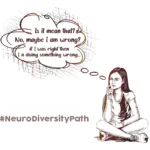Do you ever find yourself trapped in a cycle of negative thoughts, unable to break free from the grip of self-doubt and pessimism? It’s a common experience that can leave us feeling powerless and overwhelmed. But what if I told you that behind these negative thoughts lie thinking patterns that we can identify and challenge? In today’s blog post, we’ll delve into the world of cognitive distortions, those sneaky tricks our minds play on us that keep us stuck in negativity. Understanding these distortions gives you the power to dismantle them and reclaim control over your thoughts and emotions. Join us on this journey as we uncover the eight cognitive distortions behind negative thinking and learn how to cultivate a mindset of positivity and resilience.

1- Breaking Free from Black-and-White Thoughts
– Understanding All-or-Nothing Thinking
Have you ever caught yourself thinking in absolutes, seeing situations as perfect or total failures? This pattern of thinking, known as all-or-nothing thinking, can be a major roadblock to our happiness and success. This chapter will explore the insidious nature of all-or-nothing thinking and how it keeps us trapped in a rigid mindset devoid of nuance. Recognizing this cognitive distortion is the first step towards breaking free from its grip and opening ourselves up to a more balanced and realistic perspective on life’s ups and downs.
– Embracing Shades of Gray
Life is rarely black and white; it’s filled with shades of gray that add depth and richness to our experiences. By challenging all-or-nothing thinking, we can learn to embrace these nuances and see the world more flexibly and compassionately. Practice reframing extreme thoughts with statements acknowledging the complexity of reality, allowing room for successes and setbacks. Through mindfulness and self-awareness, we can gradually loosen the hold of all-or-nothing thinking and cultivate an open, resilient mindset full of possibilities.
2- Shifting from Broad Assumptions to Specific Realities
– Recognizing Overgeneralization
Overgeneralization is another common cognitive distortion that can lead us astray. It involves drawing sweeping conclusions based on limited evidence, often resulting in distorted perceptions of ourselves, others, and the world around us. In this chapter, we’ll explore how overgeneralization can perpetuate negative thinking patterns and hinder our ability to see things as they are.
– Anchoring in Specific Realities
To overcome overgeneralization, it is essential to anchor ourselves in specific realities rather than relying on broad assumptions. Start by questioning your generalizations’ validity and seeking concrete evidence to support or refute them. Practice mindfulness to become more aware of the present moment and the details of your experiences. By grounding ourselves in specific realities, we can break free from the constraints of overgeneralization and cultivate a more accurate and balanced view of the world.
3- Clearing the Fog of Negative Focus
– Focusing on the Positive
Negative focus is a cognitive distortion that can cloud our perception, making it difficult to see the bright side of life. However, research conducted by psychologist Dr. Martin Seligman at the University of Pennsylvania has shown that practicing gratitude can be a powerful antidote to negative thinking. In this chapter, we’ll explore how shifting our focus towards the positive can help us clear the fog of negative focus and cultivate a mindset of optimism and resilience. Start by keeping a gratitude journal and regularly noting what you’re thankful for, no matter how small. Practice mindfulness to become more attuned to the present moment and the beauty surrounding you. By consciously focusing on the positive, you can train your brain to see the silver linings even in the darkest clouds.
4- Recognizing and Embracing Silver Linings
– The Power of Perspective
Amid challenges and setbacks, getting caught up in negativity and despair is easy. However, recognizing and embracing silver linings can shift our perspective and find hope in even the darkest times. We can cultivate resilience and a more optimistic outlook by actively seeking out the positive aspects of difficult situations. This process involves looking beyond immediate hardships to see the potential for growth, learning, and unexpected opportunities. When we focus on the silver linings, we allow ourselves to appreciate the small victories and lessons from overcoming obstacles. Embracing this mindset helps us cope with adversity and empowers us to move forward with renewed strength and determination. By consciously choosing to see the good amidst the bad, we can transform our experiences and uncover the hidden blessings that often accompany adversity.
– The Power of Perspective
Adversity has a way of revealing our inner strength and resilience, guiding us towards growth and transformation. Instead of viewing setbacks as roadblocks, embrace them as opportunities for growth and learning. Look for the lessons adversity teaches you, and find meaning in the challenges you face. By reframing your perspective and focusing on the silver linings, you’ll not only navigate through tough times with grace and resilience but also emerge stronger and more empowered than ever before.
5- Finding Clarity in a Sea of Assumptions
– Challenging Assumptions
Assumptions often cloud our judgment and lead us astray, preventing us from seeing situations clearly. Research by psychologist Dr. Aaron Beck at the University of Pennsylvania has shown that challenging our assumptions is key to breaking free from cognitive distortions. This chapter will explore how to find clarity in a sea of assumptions and uncover the truth beneath the surface. Start by questioning the validity of your assumptions and seeking evidence to support or refute them. Practice curiosity and approach situations with an open mind, allowing yourself to consider alternative perspectives. By challenging assumptions and seeking clarity, you’ll better understand yourself and the world around you, paving the way for more informed decisions and greater peace of mind.
6- Balancing Perspective on Life’s Challenges
– The Perils of Magnification and Minimization
Magnification and minimization are cognitive distortions that can skew our perception of life’s challenges, making them seem larger or smaller than they truly are. These distortions can greatly impact our emotional well-being and decision-making processes, leading us to either overestimate the severity of our problems or underestimate our ability to cope with them. Magnification involves blowing issues out of proportion, making them appear insurmountable and overwhelming. On the other hand, minimization downplays issues, causing us to ignore significant difficulties and potentially miss out on important solutions. Understanding how these distortions work can help us recognize when our thinking is skewed and allow us to take steps to correct it. We will delve into various techniques and strategies to achieve a more balanced perspective, enabling us to better navigate difficult situations with clarity and confidence. We can improve our mental resilience and overall quality of life by addressing these cognitive distortions.
– Cultivating Balance
Finding balance is essential for maintaining perspective in the face of life’s challenges. Practice reframing your thoughts to avoid magnifying the negatives and minimizing the positives. Instead, strive to see challenges as opportunities for growth and learning, recognizing that setbacks are a natural part of the journey toward success. Embrace a growth mindset and approach challenges with optimism and resilience, knowing that each obstacle you overcome brings you one step closer to your goals. By cultivating balance in your perspective, you’ll be better equipped to face life’s challenges gracefully and confidently.
7- Untangling Feelings from Facts
– The Influence of Emotional Reasoning
Emotional reasoning occurs when our feelings dictate our beliefs about reality, leading us to make decisions based on subjective emotions rather than objective facts. In this chapter, we’ll explore how emotional reasoning can distort our perception of reality and offer strategies for untangling our feelings from the facts.
– Practicing Rational Evaluation
To overcome emotional reasoning, practicing rational evaluation of our thoughts and beliefs is essential. Pause and reflect on the evidence supporting your emotions, separating factual observations from subjective interpretations. Challenge irrational thoughts by asking yourself whether there is any concrete evidence to support them. By cultivating awareness of the influence of emotions on our beliefs, we can break free from the grip of emotional reasoning and make decisions grounded in logic and reason. We can gain clarity and perspective through rational evaluation, enabling us to navigate life’s challenges with greater wisdom and insight.
8- Liberating Yourself from Unrealistic Expectations
– The Burden of Should Statements
Should statements are rigid rules we impose on ourselves and others, setting unrealistic expectations often leads to disappointment and frustration. According to research by psychologist Dr. Albert Ellis, founder of Rational Emotive Behavior Therapy (REBT), unrealistic expectations are a major source of emotional distress. In this chapter, we’ll explore how to liberate yourself from the grip of should statements and cultivate a mindset of acceptance and self-compassion. Start by identifying the statements that govern your thinking and challenge their validity. Practice self-compassion and remind yourself that it’s okay to be imperfect and fallible. By letting go of unrealistic expectations, you’ll free yourself from unnecessary stress and open the door to greater happiness and fulfillment.
“In the end, we are the sum total of our experiences, and it’s our perceptions that shape our reality”
Vishen Lakhiani
As we conclude this exploration of cognitive distortions, it’s evident that our thoughts wield immense power over our perceptions and emotions. By recognizing and challenging these distortions, we can break free from negative thinking patterns and cultivate a mindset of clarity, resilience, and compassion. Each chapter has offered valuable insights and practical strategies for untangling the web of distorted thinking and embracing a more balanced perspective on life’s challenges. Personally, this journey has been enlightening, reminding me of the importance of mindfulness and self-awareness in navigating the complexities of the mind. I’m inspired by the potential for growth and transformation within us, waiting to be unlocked through conscious effort and introspection.
What are your thoughts on this article? How have cognitive distortions impacted your life, and what strategies have helped you overcome them? Share your reflections in the comments below.
What are your thoughts on this post? How have cognitive distortions impacted your life, and what strategies have helped you overcome them? Share your reflections in the comments below.





